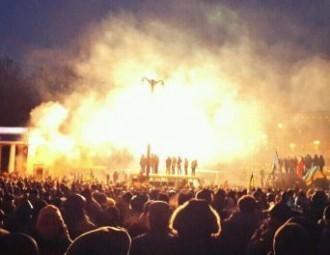Euromaidan “exploded” again

After a prolonged inactivity Euromaidan has livened up again: according to the official data, about 20 police officers have been injured in clashes with the protesters.
The clashes with riot police in the Ukrainian capital, Kyiv on January 19 came after tens of thousands of protesters gathered in Independence Square in defiance of new antiprotest legislation.
Protesters attacked police with sticks as they tried to push their way towards the parliament building, which had been cordoned off by rows of police and buses. Stun grenades were used and smoke was seen above the crowd.
Before the clashes erupted, opposition leader Vitali Klitschko called new antiprotest laws illegal and "unconstitutional."
"Today we have to take very important decisions," he said. "First, we announce as invalid and illegal the laws that were adopted by the members of parliament from the [ruling] Party of Regions on January 16. Second, we announce an early presidential election and we will have a vote on this issue. Third, the Central Election Commission's staff must be changed so that this election is fair and transparent."
Klitschko was later seen urging protesters not to provoke police.
Ukraine's opposition has accused President Viktor Yanukovich of trying to install a "dictatorship." The legislation allows for prison terms of up to 15 years for the "mass violation" of public order. The new laws also require nongovernmental organizations to register as "foreign agents" if they are funded from abroad, mirroring a similar rule on the books in Russia.
Also on January 16, opposition leader Arseniy Yatsenyuk declared the start of opposition-sponsored referendums and elections for new government bodies and officials in Ukraine. "We are starting popular voting on the lack of confidence [in the government] and over the dismissal of [Ukrainian President] Viktor Yanukovich," he said.
-
03.01
-
07.10
-
22.09
-
17.08
-
12.08
-
30.09










































